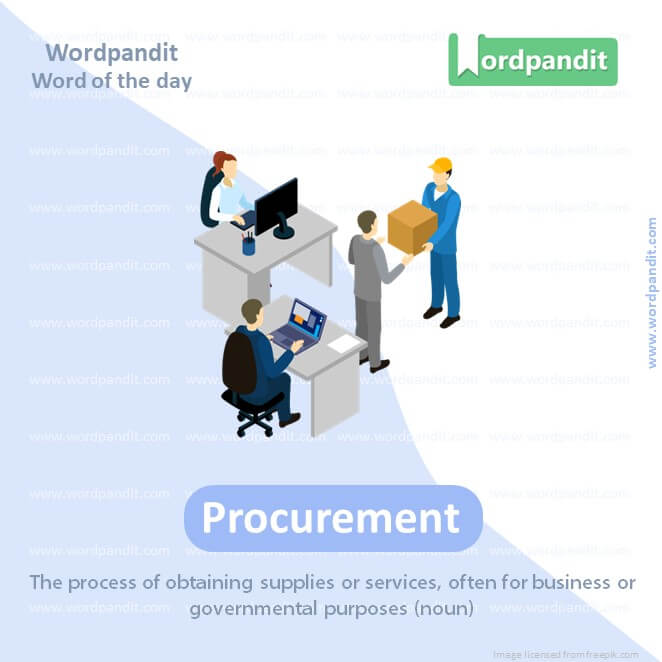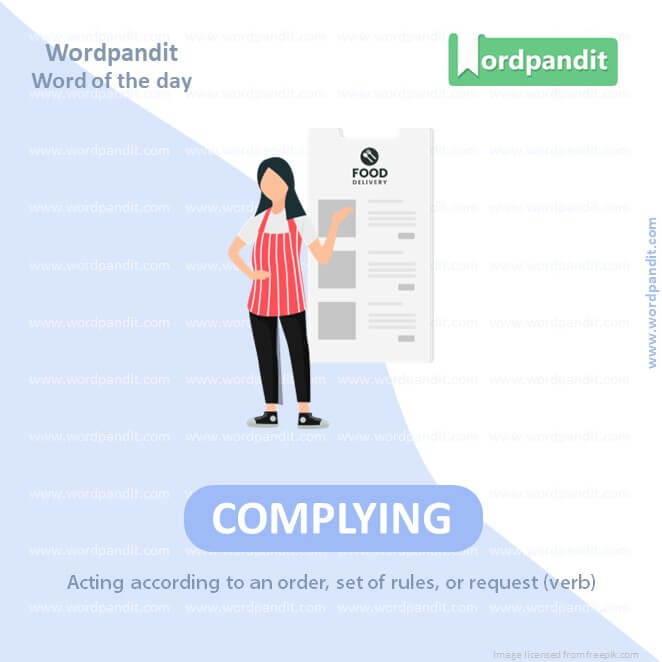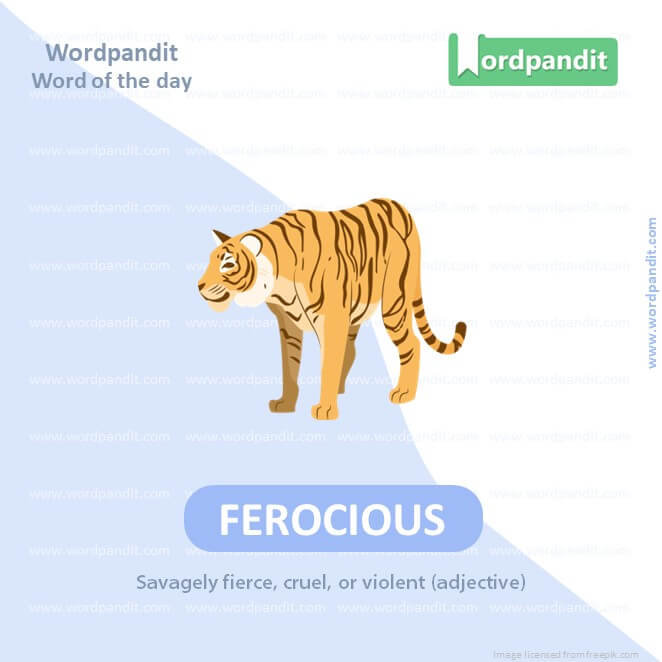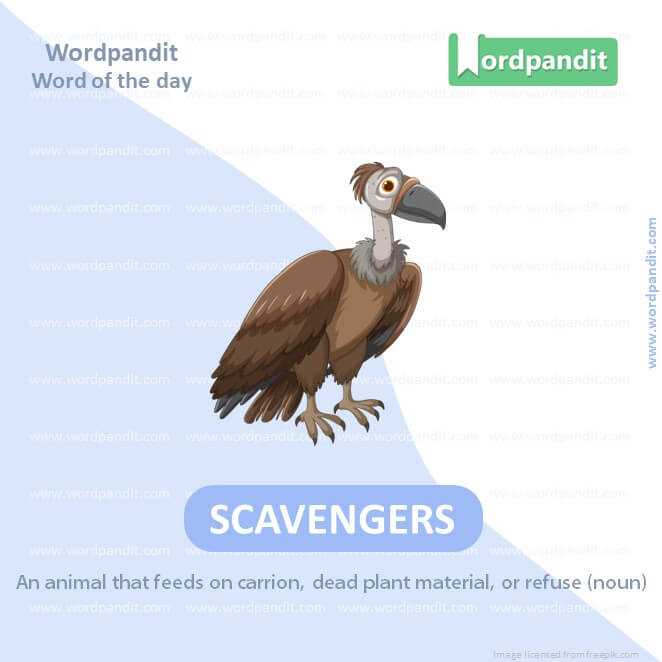Daily Vocabulary Words: List of Daily Used Words
Hi there. Welcome to this special section @ Wordpandit.
Our endeavour here is straightforward: highlighting important daily vocabulary words, you would encounter in The Hindu. This is your repository of commonly used words; essentially, we are posting a list of daily used words. Hence, this has significant practical application as it teaches you words that are commonly used in a leading publication such as The Hindu.
Visit the website daily to learn words from The Hindu.

WORD-1: PROCUREMENT
CONTEXT: the General Financial Rules (GFRs), which is a compilation of rules and orders of Government of India to be followed by all while dealing with matters involving public finances (it was amended in a comprehensive manner when I was Union Finance and Expenditure Secretary), speak about “a fair, transparent and reasonable procedure” for public procurement.
SOURCE: The Hindu
EXPLANATORY PARAGRAPH: Imagine you’re planning a big party and you need to get lots of things like balloons, snacks, and games. Going out and getting all these things is called “procurement.” It means finding and getting the supplies or goods you need for a specific purpose.
MEANING: The process of obtaining supplies or services, often for business or
governmental purposes (noun).
PRONUNCIATION: proh-KYUR-ment
SYNONYMS: acquisition, purchasing, sourcing, obtaining, buying
USAGE EXAMPLES:
1. The department is responsible for the procurement of office supplies.
2. Effective procurement strategies can save a company a lot of money.
3. She works in procurement at a large manufacturing firm.
4. There were issues with the procurement process that delayed the project.

WORD-2: COMPLYING
CONTEXT: the candidates in 543 parliamentary constituencies (even if they are 10,000 representing different political parties or independents) could game the system and deny a billion electors their statutory right by complying with the process but seriously wounding the spirit of democracy.
SOURCE: The Hindu
EXPLANATORY PARAGRAPH: Imagine your teacher has a rule that everyone must raise their hand to speak. When you raise your hand before speaking, you are “complying.” It means you are following the rules or doing what you’re supposed to do.
MEANING: Acting according to an order, set of rules, or request (verb).
PRONUNCIATION: kuhm-PLY-ing
SYNONYMS: adhering, conforming, obeying, following, abiding
USAGE EXAMPLES:
1. He was complying with the regulations set by the health department.
2. By paying the fine, she was complying with the court’s decision.
3. Complying with the new policies required some changes in the workplace.
4. The company was not complying with environmental laws.
WORD-3: SUBDUED
CONTEXT: the prospect of ‘rain washes out play’ or a ‘collusive walkover’ making the election seem ‘free and fair’ without giving people the opportunity to cast their vote without being subdued by fear or swayed by favours.
SOURCE: The Hindu
EXPLANATORY PARAGRAPH: Imagine you’re at a party where the music is not too loud and everyone is talking quietly. The party would be called “subdued.” It means quiet, not very lively, or toned down.
MEANING: Quiet and rather reflective or depressed (adjective).
PRONUNCIATION: suh-BYOOD
SYNONYMS: quiet, toned down, low-key, muted, restrained
USAGE EXAMPLES:
1. The mood at the office was subdued after the news of the merger.
2. The party was more subdued than usual, with fewer people and softer music.
3. He gave a subdued response to the announcement.
4. The colors in the painting are subdued and harmonious.

WORD-4: FEROCIOUS
CONTEXT: the Cyclones Amphan and Yaas — rendered more ferocious by climate change — deepened the destitution wrought earlier in parts of the delta by Cyclone Alia in 2009.
SOURCE: The Hindu
EXPLANATORY PARAGRAPH: Imagine a large bear roaring loudly and showing its sharp teeth. That bear would be described as “ferocious.” It means very fierce, violent, or intense.
MEANING: Savagely fierce, cruel, or violent (adjective).
PRONUNCIATION: fuh-ROH-shus
SYNONYMS: fierce, savage, brutal, vicious, intense
USAGE EXAMPLES:
1. The ferocious storm caused extensive damage to the coast.
2. He played the game with ferocious intensity.
3. The debate became ferocious as both sides refused to compromise.
4. A ferocious guard dog guarded the entrance.
WORD-5: EMBANKMENT
CONTEXT: A man from the Sundarbans may be more impressed by a candidate offering low-paying but predictable jobs over one who has secured funds to build an embankment along a river.
SOURCE: The Hindu
EXPLANATORY PARAGRAPH: Imagine a wall made of earth or stone built to hold back water or carry a roadway. This wall is called an “embankment.” It helps to prevent floods or creates a path for roads and trains over uneven ground.
MEANING: A wall or bank of earth or stone built to prevent a river from flooding an area (noun).
PRONUNCIATION: em-BANK-ment
SYNONYMS: levee, dike, ridge, barrier, bank
USAGE EXAMPLES:
1. The river overflowed despite the embankment built to contain it.
2. They picnicked on the grassy embankment overlooking the lake.
3. An embankment supports the railway tracks through the town.
4. Erosion of the embankment was a serious concern for the engineers.
WORD-6: ANOMALOUS
CONTEXT: Our understanding of such choices will be incomplete without accounting for climate change. Of course, it’s nearly impossible to blame climate change for anomalous weather over a short period and/or a small area, but it’s also true that climate change is imposing such anomalies over ‘newer’ areas and for longer durations — and making its presence felt in hard-to-predict ways.
SOURCE: The Hindu
EXPLANATORY PARAGRAPH: Imagine finding a blue apple among a bunch of red ones. That blue apple would be unusual or not what you expect. That’s what “anomalous” means. It describes something that is different from what is normal or expected.
MEANING: Deviating from what is standard, normal, or expected (adjective).
PRONUNCIATION: uh-NOM-uh-lus
SYNONYMS: abnormal, atypical, irregular, unusual, non-standard
USAGE EXAMPLES:
1. The scientist studied the anomalous results of the experiment.
2. His absence was anomalous, as he seldom missed meetings.
3. Anomalous weather patterns have been observed this year.
4. The data included a few anomalous readings that needed further investigation.

WORD-7: MANOEUVRES
CONTEXT: Gaza is a reminder of the high costs of geopolitical manoeuvres and the real-world impact of normless international diplomacy
SOURCE: The Hindu
EXPLANATORY PARAGRAPH: Imagine playing a game where you have to move your pieces around the board very carefully to win. These clever moves you make are called “manoeuvres.” It means moving skillfully or carefully.
MEANING: A movement or series of moves requiring skill and care (noun).
PRONUNCIATION: muh-NOO-vurz
SYNONYMS: operations, tactics, strategies, movements, exercises
USAGE EXAMPLES:
1. The pilot performed complex manoeuvres during the air show.
2. They practiced military manoeuvres in the training field.
3. The chess player won with a series of smart manoeuvres.
4. Emergency manoeuvres were required to avoid the accident.
WORD-8: ABSTAINED
CONTEXT: The U.S. also abstained from voting on a UNSC resolution calling for a ceasefire.
SOURCE: The Hindu
EXPLANATORY PARAGRAPH: Imagine during snack time, you decide not to have a cookie even though it’s your favorite. You’re choosing not to eat it. When you choose not to do something like this, it’s called “abstaining.” It means deliberately not doing something you can do.
MEANING: Deliberately choose not to participate in an action (verb).
PRONUNCIATION: ab-STAYND
SYNONYMS: refrained, withheld, desisted, avoided, eschewed
USAGE EXAMPLES:
1. He abstained from voting on the issue due to a conflict of interest.
2. Many people abstain from eating meat on certain days.
3. She abstained from making comments during the heated discussion.
4. During the trial, several jurors abstained from expressing their opinions.
WORD-9: PERPETUATING
CONTEXT: the U.S. continues to play a paradoxical role, simultaneously capable of ending violence and perpetuating the status quo, as evidenced by its recent veto against full recognition of Palestine.
SOURCE: The Hindu
EXPLANATORY PARAGRAPH: Imagine telling a story about a hero from your town over and over again so that everyone remembers it. This act of keeping the story alive by repeating it is called “perpetuating.” It means making something continue indefinitely.
MEANING: Making something continue indefinitely (verb).
PRONUNCIATION: puhr-PET-chew-ay-ting
SYNONYMS: continuing, maintaining, prolonging, preserving, sustaining
USAGE EXAMPLES:
1. The film was criticized for perpetuating negative stereotypes.
2. By not addressing the issue, they were perpetuating the problem.
3. Educational programs aimed at perpetuating cultural heritage.
4. He was accused of perpetuating myths about the event.

WORD-10: SCAVENGERS
CONTEXT: Septic tanks are cleaned by manual scavengers and the sludge is thrown into various water systems.
SOURCE: The Hindu
EXPLANATORY PARAGRAPH: Imagine animals like crows or raccoons that find leftover food in the wild or in trash cans instead of hunting or growing their own. These animals are called “scavengers.” They eat food that they find rather than catching or growing it themselves.
MEANING: An animal that feeds on carrion, dead plant material, or refuse (noun).
PRONUNCIATION: SKAV-en-jurz
SYNONYMS: foragers, collectors, vultures, recyclers, gleaners
USAGE EXAMPLES:
1. Scavengers play a crucial role in the ecosystem by cleaning up waste.
2. Vultures are well-known scavengers that can be seen circling overhead.
3. Urban scavengers like rats and pigeons thrive in cities.
4. The documentary highlighted the lives of scavengers in the savannah.
Vocabulary Words
When delving into the dynamic world of languages, the grandeur of ‘vocabulary words’ is all-encompassing. The importance of ‘vocabulary words’ in effective communication cannot be overstated; it’s these words that form the backdrop of any language, painting intricate pictures of thoughts and ideas.
Starting on the journey of learning ‘vocabulary words’, one should steer clear from rote memorization. The traditional structure of merely repeating words lacks the necessary context and application that actually embeds these words into your memory. To truly master the ‘vocabulary words’, one needs an integrated, immersive approach.
The first step towards mastering ‘vocabulary words’ is to engage with varied language mediums. Expanding beyond textbooks to read fiction, articles, blogs, and other forms of content not only diversifies your vocabulary but also acts as a mirror to reflect the practical application of these words. Essentially, you’re exposed to the words as they are commonly used, allowing you to truly understand their essence.
Empowering this journey, tech tools like language learning apps and memory-enhancing flashcards significantly aid in learning ‘vocabulary words’. These interactive tools provide a more engaging learning experience and hone word retention. Mnemonic devices, associating words with a unique story or visual image, enrich the process and make memory recall more efficient.
Practicing ‘vocabulary words’ by using them in day-to-day conversations exemplifies learning by doing. It also strengthens the neural pathways and improves overall word recall. This, coupled with regular revisions, ensures your grasp over ‘vocabulary words’ remains strong.
In conclusion, learning ‘vocabulary words’ is not just about adding words to your linguistic cupboard, but understanding their essence and utilizing them effectively. An inclusive approach to learning that combines diverse reading materials, technology tools, mnemonic devices and practice can really propel your mastery over ‘vocabulary words’. Remember, language is the bloodline of communication, and ‘vocabulary words’ are its heartbeat. ‘










